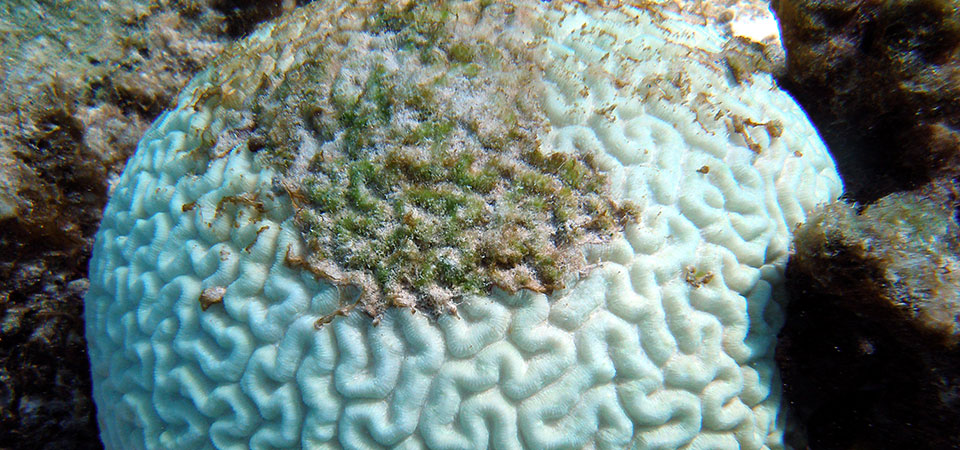Coral Bleaching
Ocean Shorts: Episode 11

What happens when a coral bleaches?
This image shows a bleached brain coral.
Transcript
HOST: Welcome to Ocean Shorts where we revisit popular Making Waves and Diving Deeper episodes. I'm your host Kate Nielsen. Today, we’ll talk about coral bleaching. In December 2014, I was joined by Jennifer Koss, the Acting Director for the NOAA Coral Reef Conservation Program and Mark Eakin, the coordinator for NOAA’s Coral Reef Watch, to discuss coral bleaching.
Let's listen in.
HOST: I think for today's episode I'd like to look a little bit more at this effect of warming waters on our corals.
JENNIFER KOSS: So I'll kick it off and then hand it over to Mark. In general, when corals experience a thermal stress, the algae that exist within the coral tissues, they're symbiotic zooxanthellae, the corals will expel them. So the color that you see on a coral is actually due to the algae that's in the tissues so when the algae is expelled the corals themselves are translucent so you get this bleached effect so that's the overall net impact of too quickly and too much warm water in a coral ecosystem.
MARK EAKIN: You know when the water warms up, what happens is it's actually good for the algae in one way in that it makes all of their photosynthetic apparatus run really great, but the problem is they run too fast; and as they run too fast they're not able to repair themselves and the lack of repair causes the algae to start releasing compounds that are toxic to the corals. The coral sees this as, "whew, we've gotta get rid of you because if we don't, we're both going," and they will actually eject the algae out from their tissues. They move them into the guts, spit them out—it's a literal gut-wrenching experience when they do this. They're breaking up pieces of tissue to get rid of this, to slough it off.
What happens is the coral is actually clear, the tissue of the coral is actually clear and that maximizes the light that can get through and get to the zooxanthellae, these symbiotic algae. Well, when the corals kick all of these algae out, it allows the light to get through to the white skeleton underneath. And you're looking at it, you're seeing white skeleton. It looks like it's been bleached, but you've actually got live tissue over the top, it's just very difficult to see unless you look really close.
Now if the event is mild enough and doesn't last too long, the corals are able to recover their zooxanthellae, go back to normal. Although they have been stressed. They have been damaged. It does makes them more susceptible to other types of disease, just like you or I are more susceptible to the common cold if our bodies are stressed—if we're not getting enough sleep, not enough rest, a lot of stress at work, whatever. Now if the event is really severe, then the problem is when these algae are gone, the corals have lost most of their food source, so they're actually starving at this point. So the longer this lasts, the less other food that's available to them, the quicker the corals are going to die.
Now that's what happens at an individual level, but if you think about the entire reef what can happen is a reef that's bleached really badly, you've got all these corals spitting out their tissues and algae into the water. All of that is degrading. You get a lot of bacterial action. In really shallow areas the water starts to smell because you're getting all of this rotting tissue on the surface. You get this slick forming. The other thing though is it's not just the corals that are affected. Everything living on that reef is affected.
HOST: That's all for today's Ocean Shorts. Thanks for joining us! For more information on coral bleaching, please see our show notes for links. Be sure to join us for our next episode.
